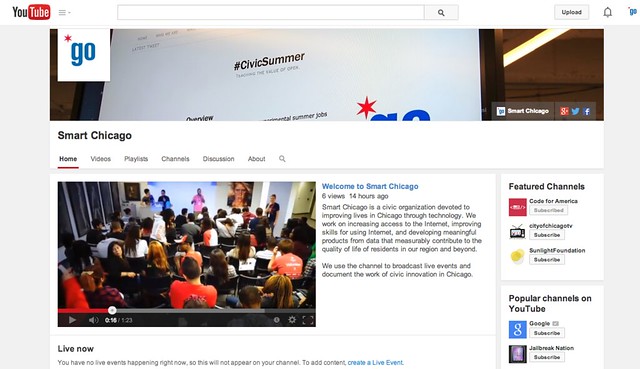This was a big year for community technology in Chicago. Here’s a month-by-month look at some of the things Smart Chicago has shared, supported, and accomplished in 2015.
January: Smart Chicago Model Featured at the Gigabit City Summit
Smart Chicago attended the Gigabit City Summit in Kansas City, MO – a three-day learning and networking opportunity exclusively designed for leaders in current and emerging Gigabit Cities. Cities convened to discuss how to facilitate business & startup growth, spark government innovation, and achieve equity of access in the presence of next generation speeds. You can see our presentation here and read our recap of the event here. Denise Linn, who we would later hire as our Program Analyst in June, was also at the Gigabit City Summit. Here is her recap of the Summit on the Living Cities blog and her research on digital equity & gigabit cities.
With the start of 2015 seeing this event and the end seeing Google Fiber’s announced interest in Chicago, the topic of gigabit connectivity has come full circle. Smart Chicago is deep in this work – right at the intersection of city data, access, skills, and infrastructure.
February: Textizen Campaign for Placemaking
Smart Chicago used Textizen to get feedback from residents on the Chicago Complete Streets Program. Chicagoans were asked to give input on utilizing and improving public street spaces. At Smart Chicago, we understand how powerful text message can be to reach new audiences and listen to our community. This was a great collaboration with the City of Chicago’s Department of Transportation. You can read a blog post about the initiative here.
By July, Textizen was purchased by GovDelivery. We see the success of this company— one that started in a Code for America fellowship, became a CfA Accelerator company, as a success for us and our quiet support. We were deeply involved at the product level— sourcing customers, paying for the service, providing brass-tacks product feedback.
March: Expunge.io & Fingerprint Terminal
Expunge.io was launched in January of 2014 as a website that helps start the process of erasing juvenile arrests and/or court records. Smart Chicago has a long history working on Expunge.io starting with the inception of the idea during our #CivicSummer program in 2013. With the support from The Chicago Community Trust, we continue to increase public awareness, support institutions, and document the juvenile expungement application process.
In March, we secured a fingerprint terminal at the Cook County Juvenile Court to help youth get their rap sheet. We know that juvenile expungement is an arduous legal process that prevents many young adults from expunging their records. The fingerprint terminal for the Cook County Juvenile Center helps young adults connect with free legal aid at the Juvenile Expungement Help Desk while also getting their rap sheet — one of the most important pieces to starting the expungement process.
April: Experimental Modes Convening
Our consultant, Laurenellen McCann, invited technology practitioners to The Chicago Community Trust on April 3 & 4, as part of our Knight Deep Dive work. The Community Information Deep Dive initiative (or just “Deep Dive”, for short) is an experiment in synthesizing new & existing community information projects into a cohesive system for engaging with residents from the seat of a community foundation.
The convening was an investigation into what it means to build civic tech with, not for. It answered the question, “what’s the difference between sentiment and action?” through the experiences from the practitioners in the room. Here is a recap of the day including everyone who attended the convening. Laurenellen conducted an enormous amount of research around this topic which can be found on our website and in this book.
May: Foodborne Chicago Recognized as the Top 25 Innovations in Government
In May, our partner Chicago Department of Public Health (CDPH) was recognized as a Top 25 program in the American Government Awards competition by the Ash Center for Democratic Governance and Innovation for its Foodborne Chicago program. Smart Chicago launched Foodborne Chicago in March 2013 with the goal of improving food safety in Chicago by connecting people who complain about food poisoning on Twitter to the people who can help them out — the Chicago Department of Public Health.
June: City of Chicago Tech Plan 18-month Update
The City of Chicago released the 18-month Update to its Tech Plan and highlighted a number of Smart Chicago projects: Smart Health Centers, Youth-Led Tech, Connect Chicago, Foodborne Chicago, and CUTGroup. The Plan also discussed WindyGrid and the Array of Things sensors — projects where Smart Chicago is a civic engagement partner.
Here’s @CityChicagoCIO talking with @MikvaChallenge about Chicago’s tech plan pic.twitter.com/tqKoMltzCp
— Smart Chicago (@SmartChicago) July 2, 2015
Read Smart Chicago’s take on the 18-month update here.
July: Youth-Led Tech
We can’t talk about Smart Chicago’s work in 2015 without talking about Youth-Led Tech. Youth-Led Tech was supported by a grant from Get IN Chicago, an organization that supports and evaluated evidence-based programs that lead to a sustainable reductions in violence. For 6 weeks, 140 youth were taught technology curriculum in 5 neighborhoods across the city of Chicago: Austin, Englewood, Humboldt Park, North Lawndale, and Roseland. After completing 170 hours of WordPress training and content creation, the youth earned their own laptops in a graduation ceremony at Microsoft Chicago’s offices. 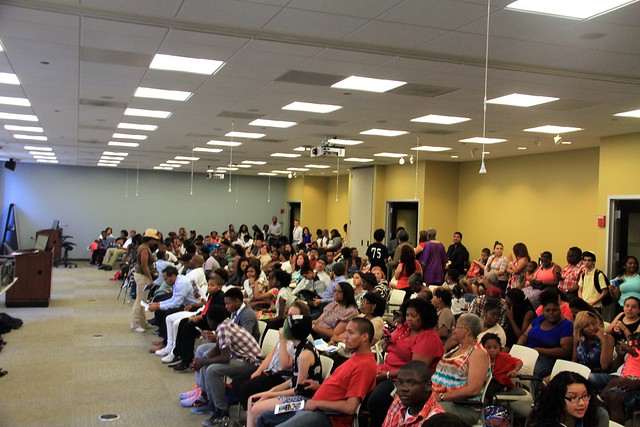
Smart Chicago documents everything, not only for our sake, but for the sake of others in the digital skills & access ecosystem. We have released the full curriculum online for anyone to use and adapt. We have our catering data, our instructor hiring process, profiles of our learning environments, and screenshots of the youth websites online. Later in 2015, Susan Crawford wrote a piece about the program in Medium, documenting the philosophy of the tech program where the youth, and not the tech, were prioritized:
There were also social-emotional learning elements of the program — peace circles, restorative justice — and talks about power in the city of Chicago. And here’s where Dan O’Neil’s attention to food fits in: O’Neil says the number one message he wanted to get across to the youth in the program was, “”We love you and we’re never going to let you go.’”
To access more links about Youth-Led Tech, visit this section of our website.
August: Bud Billiken Parade
Smart Chicago partnered with Chicago Defender Charities to support their efforts to include more technology tools (such as live-streaming and Textizen voting) in their programs. In August, we provided text voting during the Bud Billiken Parade so spectators could vote for their favorite youth dance teams, music groups, and performers.
Smart Chicago staff, consultants, Smart Health Navigators, and Youth-Led Tech instructors also marched in the parade! We marched with our friends Gray Era Brass, handing out swag, promoting the text voting campaign, and shared information about Smart Chicago programming.
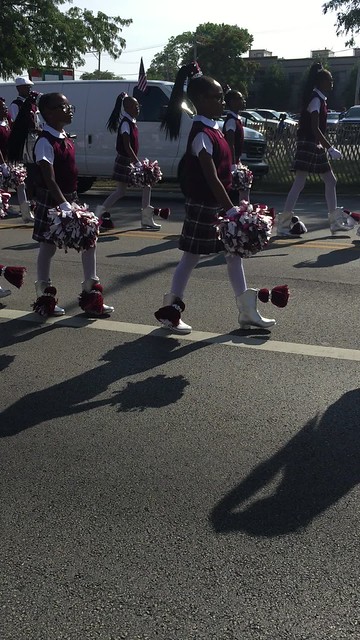 We look forward to continued collaboration with Chicago Defender Charities beyond 2015. For more information on the Bud Billiken Parade, see this blog post.
We look forward to continued collaboration with Chicago Defender Charities beyond 2015. For more information on the Bud Billiken Parade, see this blog post.
September: Our Civic Tech Publications & Philosophy
September 2015 saw the launch of publications and thought pieces emphasizing the importance of authentic civic engagement in technology and articulating Smart Chicago’s civic tech framework. We believe that the real heart of civic tech isn’t code, the apps, or the open data. It’s the people. The neighborhood tech youth instructor, for instance, onboards family, friends and neighbors into the digital economy and tech pipeline, but their work is too often hidden or uncelebrated. Executive Director Dan O’Neil penned the Civicist post, “The Real Heart of Civic Tech isn’t Code.” Here’s an excerpt:
Civic tech that doesn’t include people like Akya, Angel, and Farhad leads to a distorted vision of the field. A vision that leads with technical solutions rather than human capacity. A vision that glorifies the power of the developer rather than the collective strengths of a city.
Experimental Modes of Civic Engagement in Civic Tech by Laurenellen McCann was also published in September. This book represents the culmination of the Experimental Modes work under Deep Dive and was fueled by a scan of the field and practitioner convenings. It can be ordered on Amazon and read online. Our friend and former consultant Chris Whitaker also documented his civic tech lessons learned in the Civic Whitaker Anthology. These books are a testament to the great work of the authors, but also catalyze conversation for the civic technology and how the movement be innovative, engaging, and inclusive.
October: NNIP & Chicago’s Data Ecosystem
To build on the data ecosystem research and work of the Chicago School of Data, Smart Chicago started engaging with the National Neighborhood Indicators Partnership (NNIP). We attended the Dallas NNIP meeting in October. NNIP is a collaborative community of 35+ cities and the Urban Institute. Partners centralize, analyze, and engage residents with neighborhood-level data. You can read our recap of the NNIP meeting lessons and themes in this blog post.
Our first #NNIP t-shirt exchange. pic.twitter.com/tBnq96MZKR — NNIP HQ (@NNIPHQ) October 23, 2015
Continuing last year’s work with the Chicago School of Data survey and the Chicago School of Data Days, we seek to coordinate and support Chicago’s strong data ecosystem. Who is in that ecosystem? Institutions like DePaul’s Institute for Housing Studies, the Woodstock Institute, Chapin Hall, and the Heartland Alliance, just to name a few. Here is a taxonomy of this ecosystem that fuels our thought and collaborative framework in this area.
We look forward to continuing our engagement with NNIP and contributing to that network of cross-city practitioners.
November: Smart Health Centers
Our Smart Health Centers program places trained health information specialists in clinics to assist patients in connecting to their own medical records and find reliable information about their own conditions. In 2015, we expanded the program to more locations and hired a few of our Youth-led tech instructors from the summer as navigators. You can read Akya Gossitt’s story about her path leading to becoming a Youth-led Tech instructor and then a Smart Health Center Navigator.
We also began recording and sharing podcasts developed by the Smart Health Center Navigators. The Navigators discuss topics like healthy holiday meals and the digital divide in health care. You can listen to them on the Smart Chicago soundcloud account. We are excited to provide more opportunities like this to our Navigators and amplify their voices.
December: Final Integration of CUTGroup Text Message Solution
In September, we announced that residents can now sign up for CUTGroup via text message. This month, we implemented the last piece of this work where testers can also learn about new testing opportunities and respond to screening questions via text.
29% of 1,000+ people in @CUTGroup cite “public wifi” or “phone with data plan” as primary connection to the internet. pic.twitter.com/kWgDnYvfyL
— Smart Chicago (@SmartChicago) September 25, 2015
We did this work because if you do not have Internet access at home, you are limited by your time commitment on a public computers and might not have a chance to respond toemails in time to participate in a test. Out of our 1,200+ CUTGroup members today, 29% of our testers said their primary form of connecting to the Internet is either via public wifi or their phone with data plan. The impetus behind this project is to serve the large and growing number of residents who do not have regular access to the internet. By adding a text mode, the CUTGroup will be more effective at discovering resident’s voice.
More in 2016
We thank all of our founders, partners and consultants who have been a crucial part of this work.
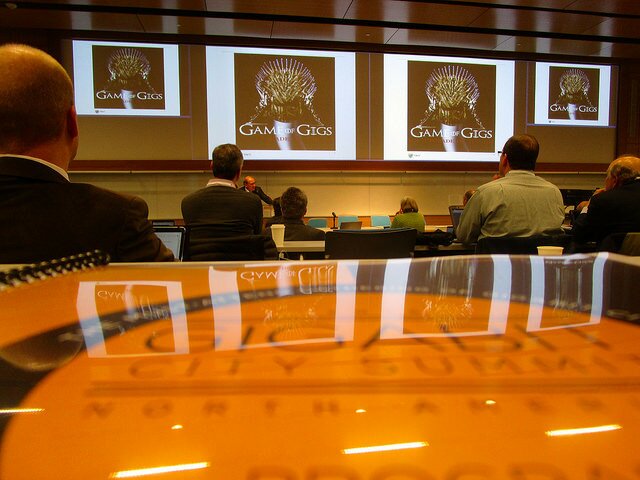
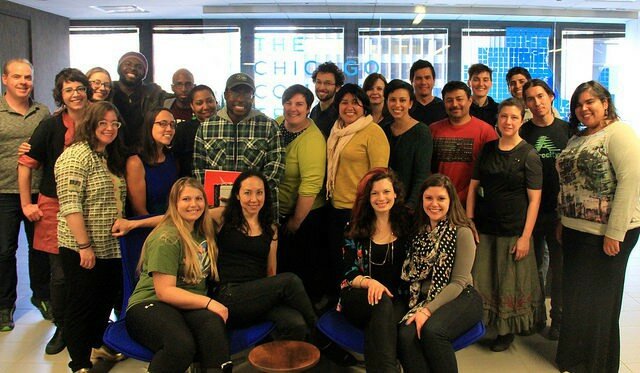

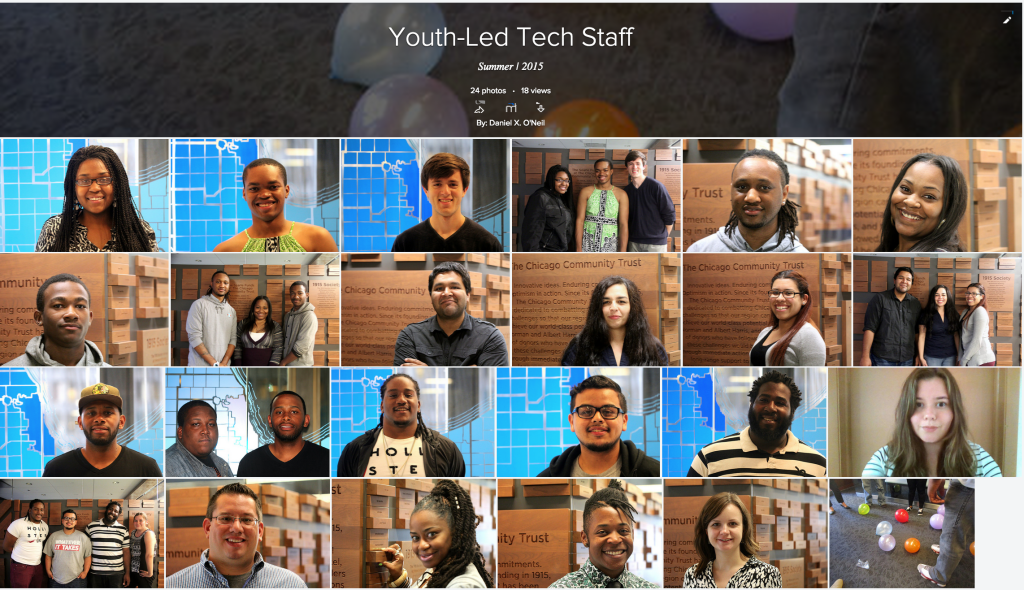
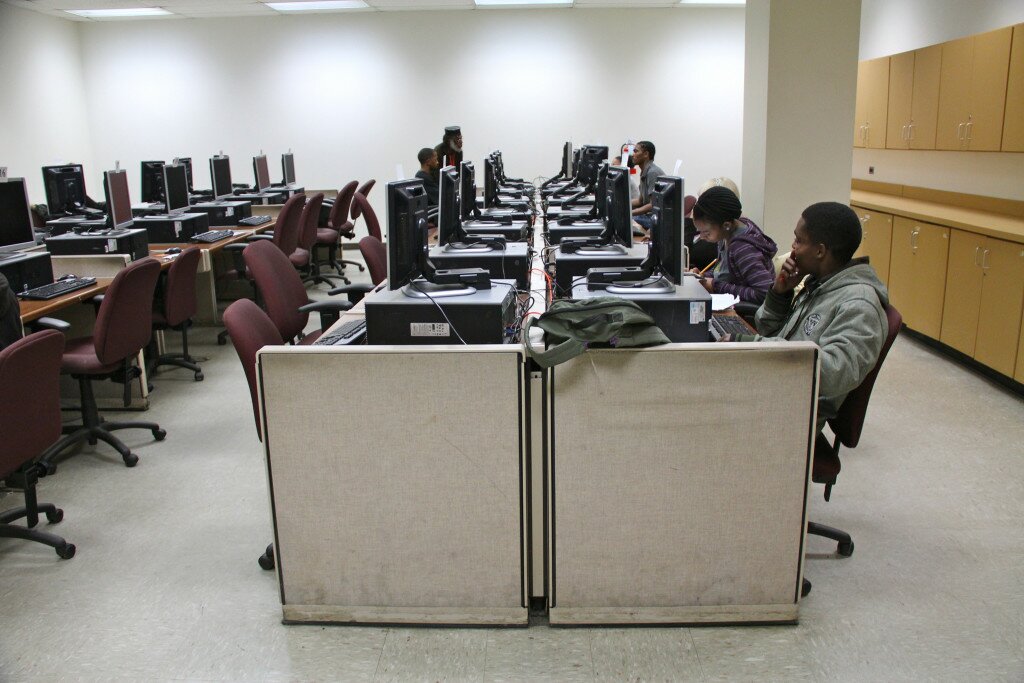
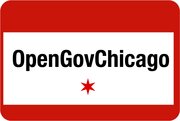 At OpenGovChicago this year, we’ve been focusing on learning about and helping grassroots groups that interact with official government functions. This time the focus was on Chicago Public Schools and Local School Councils. Local School Councils were first created in 1988 from the
At OpenGovChicago this year, we’ve been focusing on learning about and helping grassroots groups that interact with official government functions. This time the focus was on Chicago Public Schools and Local School Councils. Local School Councils were first created in 1988 from the 